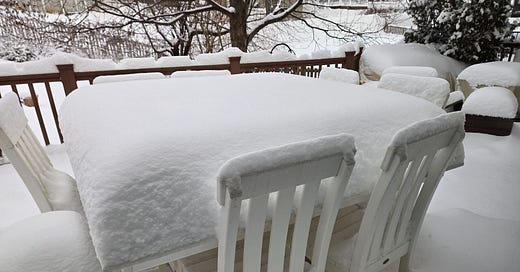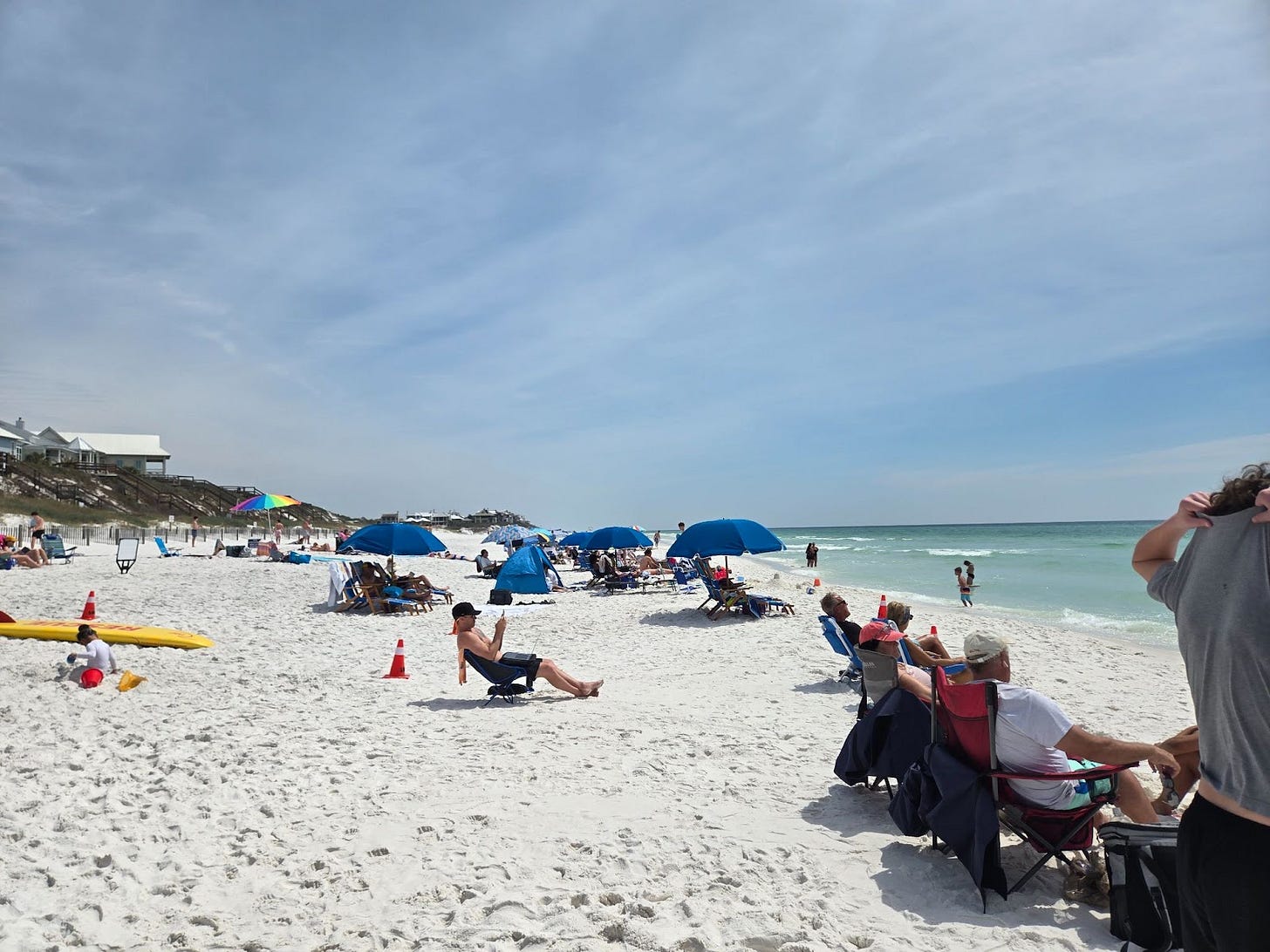View
It really wasn’t that long ago that I was shoveling my driveway. I don’t remember exact dates and it isn’t important enough to look it up, but January was cold and snowy. Everything was covered and frozen and unlike most winters here, it stayed covered and frozen for many weeks. We grew up in Michigan and I have always found beauty in winter. A sparse, often grey, bleak beauty, but a beauty nonetheless. Here we are a couple of short months later and everything is different - green, flowering, alive.
It was just a week ago our family was on Spring Break on a beach in Florida - sun, sand, the sounds of warmth and waves breaking. Spring break in a warm place is like kick-starting summer - and that is part of what we see in Spring - a developing doorway into the more mature season of Summer. Spring is a new beginning - the end of winter and the promise of more (and the promise of Summer is often better than the reality, but it is awfully appealing crouching in a January driveway.) It is death to life. Or what seemed to be dead to what is alive and vibrant. Flowers and trees and all manner of things in the ground, well, spring to life. What seemed irrevocably dead (if we didn’t know Spring was coming) is now transformed … new. This newness is cyclical - we know in our minds and in our bones that it will come around again, even in what we refer to as the dead of winter. Spring is an act of faith in the middle of the winter - faith in the sense of the word that we usually see in the bible, not a blind hope, but a belief in what was promised but what seems so far away.
Is this death to life, this renewal, this promise, something more than an ecological accident resulting from a random placement in orbit at just the right distance around a sun that is just the right intensity? Is there a spiritual dimension to this renewal? In Lewis’ Narnia, as the four Pevensie children discover the world beyond the wardrobe, the White Witch reigns and it is ‘always winter and never Christmas’. All the bleakness of winter, without the hope of Christmas. When Aslan returns after a very long absence, the snow melts, the birds sing, the flowers bloom, the streams bubble with open flowing water, the sun shines in a bright blue sky - Spring returns. The renewal of Spring was accompanied by a renewal of the land and the people that was more than merely physical. It was a renewal that was a redemption - with the promise of a more ultimate redemption to come.
This is the promise of Spring - that there is more to the promise of Spring than birds and flowers - there is a more permanent, more ultimate hope to which the birds and flowers point. I mentioned Narnia earlier, but I had a different Lewis writing, a poem, in mind when I remembered the January driveway from the perspective of another early Spring.
What the Bird Said Early in the Year
I heard in Addison’s Walk a bird sing clear:
This year the summer will come true. This year. This year.
Winds will not strip the blossom from the apple trees
This year, nor want of rain destroy the peas.
This year time’s nature will no more defeat you,
Nor all the promised moments in their passing cheat you.
This time they will not lead you round and back
To Autumn, one year older, by the well-worn track.
This year, this year, as all these flowers foretell,
We shall escape the circle and undo the spell.
Often deceived, yet open once again your heart,
Quick, quick, quick, quick!—the gates are drawn apart.
C.S. Lewis
One year (this year in the birds view) the promise of Spring will come true. The promised moments will not simply pass, they will remain. One year, we will not remain in the circle of the seasons, we will escape and undo the spell that brings the bleakness of Winter. What Spring promises - what we can catch in the brief glimpses offered to us by Spring and all other expressions of beauty and hope and truth - one day will be fulfilled. We have been disappointed, even deceived, Lewis writes, by the passing of these glimpses - but open once again your heart as the gates are drawn apart. One day Spring will come.
Take
My habit and practice is to remain abreast of happenings in the world. In doing so, I attempt to train myself to remember an eternal perspective and the big story we are in - a story in which the current events can be evaluated as what they are - not ultimate, important, but not ultimate.
When it comes to staying abreast of what is happening in the world, I have seen two opposite errors - one of which I would be more susceptible to than the other. One wrong turn is an over-identification with what is happening - particularly with the political and cultural happenings that are all around us. This leads to anger, anxiety, and a lack of charity for others. The other wrong turn, the one I am more prone to take, is withdrawing from keeping abreast of these happenings. There is a certain healthy distance one can keep, and then there is avoidance. This leads to apathy, disengagement, and often, a lack of charity for others.
There is a passage of scripture that applies here. I rarely quote it because it is often so misused to imply everything is always going to turn out great.
“For I know the plans I have for you,” declares the Lord, “plans to prosper you and not to harm you, plans to give you a hope and a future.”
Jeremiah 29:11
The context for this promise is one in which everything appears to be going wrong for God’s people and all of the promises seem to be dead. The context is also that hardship awaits. God’s people won’t escape hardship. But the promises are all still true. That is what I hope to remind myself and others in this time when things seem a bit haywire - all the promises are all still true. Faithfulness in our everyday life still matters. And one day Spring will come.
Links
C.S. Lewis’s Poem, “What the Bird Said Early In The Year” - Justin Taylor - TGC





